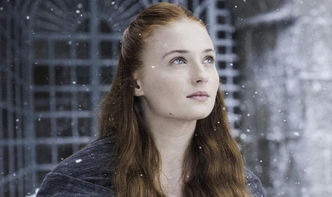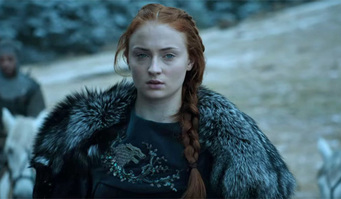Written by Kate McHargue Episode recaps are a time honored tradition when it comes to Game of Thrones (or any show you’re currently obsessed with, really). Friends gush about their favorite scenes, acquaintances quote their favorite lines in Facebook status updates, the internet runs wild with spoiler alerts and fan theories and memes, and even the stars of the show tweet pride or displeasure at the actions of their Westerosi counterparts. It’s a cycle of detox and re-tox. Let’s unpack and analyze the hell out of that episode and then get pumped for the next one. But with this important ritual comes an interesting phenomenon. Inevitably, as we all sit on the couch and recount the episode’s highlights, one friend will begin ranting about how much they hate [INSERT CHARACTER’S NAME HERE]. Anyone even remotely familiar with GoT knows that there is a plethora of easily despised characters, from the somewhat annoying Maester Pycell to the downright wicked Ramsey Bolton. But one name that I’m always shocked to hear in these exclamations of loathing is none other than Sansa Stark. Let me be clear, I’m not shocked by this because I think there is nothing to dislike about Sansa. For all her good qualities she is still spoiled, presumptuous, naïve to the plight of the common folk, and downright ungrateful sometimes. But the Sansa haters never really mention these faults. After watching the sixth season’s first episode, “The Red Woman,” in which Sansa escapes Winterfell and the clutches of her abusive husband, Ramsey Bolton, my friend uttered the words, “I wish Sansa would stop being so weak.” There were nods and murmurs of agreement at this statement and I could not for the life of me figure out why. I’m not a huge fan of Sansa, personally. If I had to pick a favorite character she’d likely not even make the top ten. But for all the words I’d use to describe a young woman who lost her home and family and spent years of her life living in fear of multiple abusers, weak is certainly not one of them. I pressed my friend on her assessment of Sansa. What did she mean by weak? The response she gave detailed the fact that Sansa had indeed been passed from abuser to abuser (Joffrey and Cersei, Littlefinger and her Aunt Lysa, Ramsey Bolton, etc.) but then reasoned that she had never managed to escape any of them or fight back, and this is what made her worthy of intense dislike. There are a lot of feminist pros and cons to Game of Thrones. Pros: Strong and diverse female characters, women in positions of power, women who defy gender norms. Cons: inequity between male and female nudity, violence against women and sexual assault used as spectacle, female stars being paid less than their male counterparts. All of this is a discussion for another day. But a truly dangerous and anti-feminist perception from GoT fans is the demonization of Sansa Stark and the idea that there is a “right” way to be a survivor of trauma or sexual assault.  The problem I see with my friend’s assessment of Sansa is that it reduces her entirely to the role of “victim” and then condemns her for the ways in which her trauma defines her. She isn’t allowed to be called a survivor because apparently that term only applies to women who “get themselves out” or “get their revenge”. This becomes problematic for women everywhere for two reasons. One, it provides another category for women to be in competition over. My friends not only agreed that Sansa is weak but as proof they compared her to other GoT heroines who supposedly represented the “right” way to overcome abuse and trauma. Never mind society’s insistence that women must compete for jobs, men, compliments, etc. Now apparently we have to compete over who can best conform to the victim ideal, who can best overcome their abuse and abusers and show the world they can’t be broken. While some could argue this has a powerful message (overcome, do not break, don’t let the patriarchy get you down), the underlying message is that it is the victim’s responsibility to heal or survive according to society’s standards and not at their own pace, comfort level, or means. By insisting a survivor be a certain kind of powerful, you remove their power. Secondly, any woman who sees themselves in Sansa is being told that they are also weak and worthy of ridicule. There is a consistent outcry among women in geek culture (and every other community, for that matter) for more diverse representation, for more women in more roles with more complexities. Representation and being able to see one’s self in media and popular culture is a powerful affirmation that you are not alone. And yet, when presented with Sansa Stark, the GoT viewing audience seems more concerned with wishing she were more like the other women on the show. Apparently, diversity in representation only applies to conventionally “likeable” characters. The root of the problem is our society’s expectations of victims. It’s not enough to one day find yourself free and healthy and regaining your agency, unless you’ve stabbed Meryn Trant in a brothel or burned a city to the ground you’re doing it wrong. Granted, in episode nine “Battle of the Bastards,” Sansa does get her revenge moment and I’d be lying if I said I didn’t love it, but it felt to me like an unnecessary attempt to “strengthen” her character or appease an audience that is always crying for more blood. When it comes to victim advocacy, it’s not enough to support the real life women who’ve survived trauma. It’s not enough to uphold the fictional women who found their freedom or got their revenge. We have to support the women who are still struggling to escape their abusers. We have to praise the fictional representations of women who endure and survive and hopefully someday find peace. We have to applaud the strength of Sansa Stark and recognize that even if she had never gotten the chance to feed Ramsey to the dogs, she is a survivor.
0 Comments
Leave a Reply. |
Archives
March 2025
|
|
© 2012-2025, Nerds That Geek LLC.
All Rights Reserved. |
uWeb Hosting by FatCow

 RSS Feed
RSS Feed